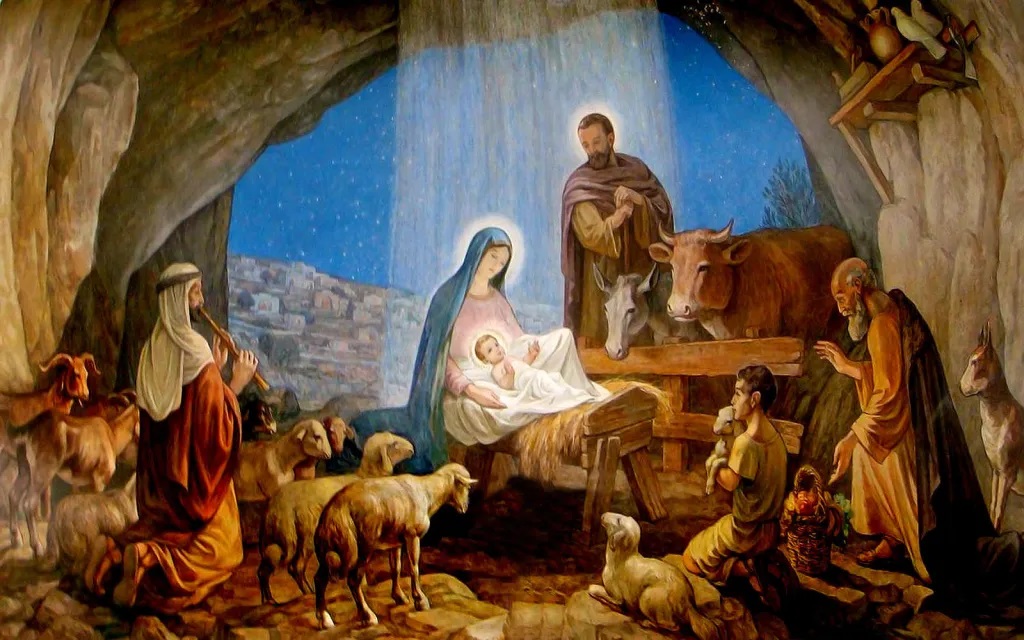"The Word became Flesh and made His dwelling among us, and we have seen His glory: The glory of an only Son coming from the Father, filled with enduring love." (John 1:14)
Today the Church celebrates the Birth of Jesus Christ, the first day in the octave of Christmas. Throughout Advent, the Church longed ardently for the coming of our Savior. Today she celebrates His birth with unrestrained joy. "The Word was made flesh and dwelt among us." The Son of God became man to give us a share in that divine life which is eternally His in the Blessed Trinity.
Christmas time begins on December 24 with the first Vespers of the feast and ends on the feast of the Baptism of Christ. White vestments reappear in our churches as a sign of joy. The Christmas feast is a festival full of joy. The Eternal Word has become Man and dwells among us. The longings of the patriarchs and prophets are fulfilled. With the shepherds, we hurry to the manger and adore the Incarnate Son of God, who for us and for our salvation descended upon earth.

The purpose of the Christmas feast is beautifully expressed in the Preface of the Nativity: "For by the mystery of the Word made flesh the light of Thy glory hath shone anew upon the eyes of our mind; so that while we acknowledge Him a God seen by men, we may be drawn by Him to the love of things unseen."
From the very beginning, Christians celebrated what the Lord Jesus accomplished for the salvation of humanity. They did this every Sunday, the day of the Lord’s resurrection, and as an annual feast on the Sunday after the first full moon of the spring equinox, Easter Sunday.
At the beginning of the 4th century, the liturgical calendar began to evolve, giving value to the “historical” Jesus as well. Good Friday was added to recall Jesus’ death, and the Last Supper…. In that trajectory, the Nativity, the Birth of Jesus, was added. The first evidence of the celebration of the Nativity of Our Lord dates back to the year 336. Soon after, in the Eastern Church, the Christmas feast of the Epiphany began to be celebrated on the 6th of January.
Christmas is the only liturgical celebration with four Masses, the Vigil Mass, the Mass during the Night, the Mass at Dawn and the Mass during the Day. The readings are the same for each of these Masses for all three liturgical years. This choice seeks to demonstrate and enhance, almost in slow motion, that Event that changed the course of human history: God became man.
During the Christmas season there is an extensive exchange of greetings and good wishes among friends. These greetings are a reminder of those "good tidings of great joy that shall be to all the people, for this day is born to you a Savior Who is Christ the Lord" (Lk. 2:11). They are a reminder, too, that all blessings and graces come to us from Christ: "Hath He not also with Him given us all things?" (Rom. 8:32).
Typically, there is also an exchange of gifts. This custom should recall to us that on this day God Himself gave to us the greatest of all gifts, His beloved Son: "God so loved the world as to give His only begotten Son" (John 3: 16).
The Birth of Our Lord Jesus reminds us that God is present in every situation in which we believe He is absent or in which we think He could never be. This faith drives us to view this time with greater serenity and hope. God is here. He is so present that perhaps, or rather He is certainly asking us to reconsider how we live. He is inviting us to remember that just as He came to save us, so too, we can be saved only if we walk together with Him, if we learn to take care of each other. We are invited to become “mangers” where others can nourish themselves on the bread of friendship, love, mercy, hope. The Lord offers Himself to us so we might bear Him through the witness of our lives. As Christians, we are called to be filled with the hope of this humanity, so disoriented and isolated, to become sentinels of a new dawn…so that the darkness of this time might be shattered by the Light that comes from the Lord Jesus, that is the Lord Jesus.
Other Saints of the Day
1. Saint Adalsindis of Hamay
2. Saint Anastasia of Sirmium
3. Saint Eugenia of Rome
4. Saint Matthew of Albano
5. Saint Romulus of Berry